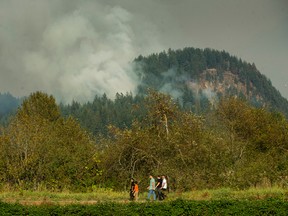The main causes of the high concentrations of particulate matter are fires near Chilliwack Lake, Hope and in Washington state

An air quality advisory has been issued for the eastern Fraser Valley due to particulate in the air due to wildfire smoke.
The main cause of the high concentrations of particulate matter in the area is a fire southeast of Chilliwack near Chilliwack Lake, near Hope and in Washington state. The smoke is affecting several municipalities including Agassiz, Chilliwack and Hope.
Start your day with a roundup of B.C.-focused news and opinion delivered straight to your inbox at 7 a.m., Monday to Friday.
Thanks for signing up!
A welcome email is on its way. If you don't see it, please check your junk folder.
The next issue of Sunrise presented by Vancouver Sun will soon be in your inbox.
Concentrations remain below the threshold for an advisory but the smoky skies are being exacerbated by high humidity and low winds. The Minnekhada Regional Park wildfire in Coquitlam, though now mostly under control, may also be contributing to the haziness.
The stagnant weather is expected to last a few more days and there may not be much improvement in air quality. The degree of smokiness will vary widely depending on where you are in the region.
Fine particulate is defined as airborne solids or liquid droplets with a diameter of 2.5 micrometres or less, making the particles able to easily penetrate indoors.
Anyone experiencing symptoms should avoid or reduce physical activity, especially if breathing is difficult. Those with underlying conditions, children, the elderly and those who work or live outdoors are more susceptible.
More information on dealing with the effects of wildfire smoke is available on the B.C. Centre for Disease Control website. Data on air quality can be found on the B.C. government’s air quality map.


